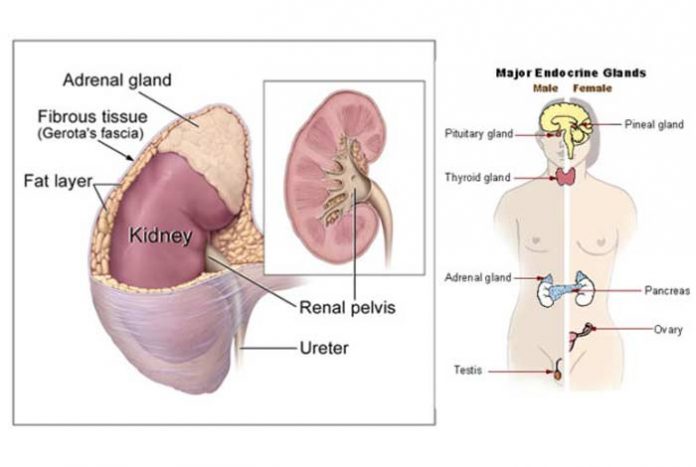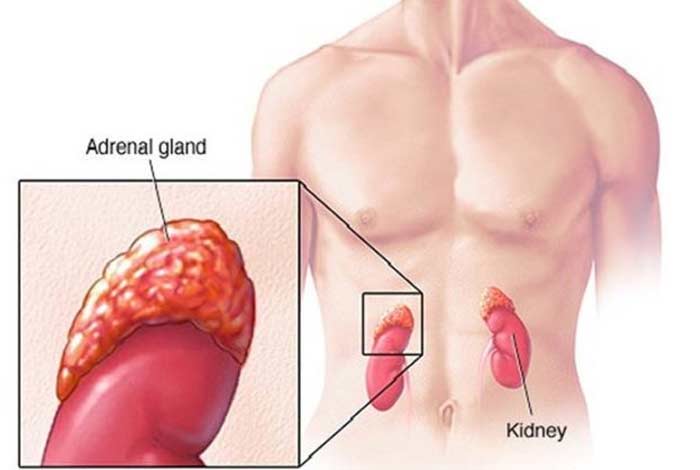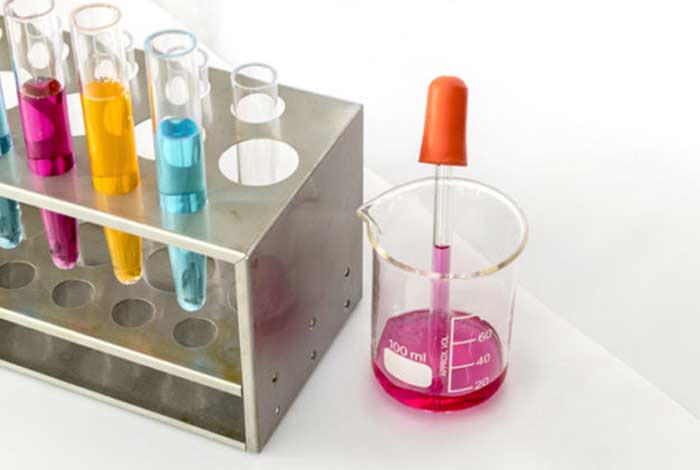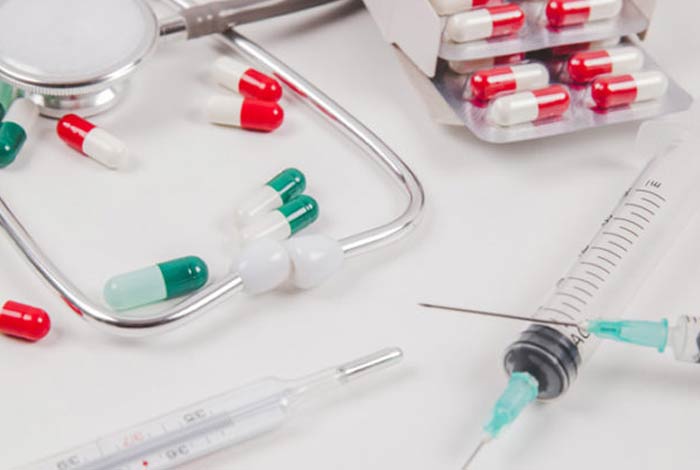
Overview and Facts
Addison’s disease, sometimes called hypoadrenalism or adrenal insufficiency, is a rare disease caused by the imbalance of hormones of adrenal gland. Adrenal gland which are two small glands that are located on top of the kidneys and produce two essential hormones called cortisol and aldosterone. When a patient is suffering from Addison’s disease, the production of adrenal hormones, i.e. cortisol and aldosterone reduces in their body causing various complications.
Hormones produced in our body, control various functions of our body. When there is any kind of imbalance of hormones, i.e. too much or too less in body, it results in various complications. Similarly, in case of Addison’s disease, when the adrenaline gland fails to produce enough amounts of hormones, it leads to various complications.
It is a life-threatening disease and can happen to anyone, irrespective of their age or gender. However, the treatment of Addison’s disease is possible with the help of artificial adrenal hormones that can fulfill the body’s hormonal requirements and can help the body function properly.
The problem is rather rare and is generally found in one out of 100,000 people. Most of the diagnosed cases of Addison’s disease are found in people aged between 30 and 50 years.
According to stats, there are about 8,400 people in the UK who are suffering from Addison’s disease. Also, John F. Kennedy, the 35th president of the United States had the same.
Types and Symptoms of Addison’s Disease
Addison’s disease is classified on the basis of what is causing the adrenal imbalance. Addison’s disease (adrenal insufficiency) is classified as follows:
- Primary adrenal insufficiency: When the Addison’s disease is caused as a result of damage to adrenal gland (cortex), it is called primary adrenal insufficiency. In this condition, the cortex fails to produce enough amount of adrenocortical hormone which can lead to various health complications. This type of disease is generally caused when the immune system attacks the cortical part of adrenal gland causing damage to it, which results in decline in production of hormones.
- Secondary adrenal insufficiency: This type of Addison’s disease is caused due to malfunctioning of pituitary gland. The pituitary gland produces a hormone known as adrenocorticotropic hormone (ACTH) which controls the hormone production from adrenal cortex gland. When the pituitary gland produces insufficient amount of ACTH hormone, the production of hormone of adrenal cortex gland also reduces causing secondary adrenal insufficiency Addison’s disease.
Sometimes the intake of corticosteroids (used for treatment of asthma, arthritis or some other chronic condition) also causes secondary adrenal insufficiency.
Some of the common symptoms of Addison’s disease are:
- Weakening of muscles and chronic fatigue.
- Loss of appetite and digestive issues which cause effective weight loss.
- Dizziness caused by low blood pressure which can even lead to fainting spells.
- Hyperpigmentation, i.e. skin darkening when exposed to skin. However, the parts of the body. which aren’t exposed, such as gums, can even get dark blotchy spots.
- Hypoglycemia or low blood sugar levels.
- Diarrhea, vomiting, or nausea.
- Stress management issues.
- Mood swings
- Irritability and Depression
- Abdominal pain
- Pain in joints and muscles
- Craving for foods that contain effective amount of salt
- Loss of body hair or sexual dysfunction (specifically in women)
These symptoms are slowly observed during the course of time. However, there are certain situations such as an accident or some other illness which cause stress can lead to the immediate worsening of the symptoms which can be life threatening. This is known as Addisonian crisis or acute adrenal failure. Symptoms of Addisonian crisis include:
- Excessive pain in abdomen, legs, or lower back
- Severe dehydration caused by vomiting and diarrhea
- Weakening of muscles and fatigue
- Dizziness
- Fever
- Low blood pressure
- Sudden loss of consciousness
- Hyponatremia, i.e. low sodium levels, and hyperkalemia, i.e. high levels of potassium
- Sudden shocks
- Problems associated with blood flow, such as sudden shocks or organ failures

Risk Factors of Addison’s Disease
There are certain health conditions that increase the risk of Addison’s disease, these include:
- Cancer
- Chronic infections such as tuberculosis, fungal infections, HIV, etc.
- Hyperthyroidism (too much production of thyroid hormone) or chronic thyroiditis (reduced thyroid functions caused as a result of inflammation of thyroid gland)
- Autoimmune disorders such as Diabetes (type-1), Grave’s disease, etc.
- Testicular failure, i.e. testicles not being able to produce male hormones
- Use of anticoagulants, i.e. blood thinners
- Surgery of adrenal gland

Do I have of Addison’s Disease?
If you observe any of the symptoms of Addison’s disease, then there are chances that you have Addison’s disease. However, the symptoms of the disease develop slowly and are barely observed in initial stages.
But, if you are at risk of Addison’s disease, i.e. have a chronic infection or problems related to thyroid gland or pituitary gland, then the best advice is to go for the diagnosis of this disease. Early detection of Addison’s disease and can help you save yourself from its complications.

Causes and Prevention of Addison’s Disease
Addison’s disease, generally called adrenal insufficiency, is caused when the adrenal gland is damaged and fails to produce enough quantities of adrenal hormones. This leads to various hormonal imbalances in body causing various complications.
However, on the basis of what causes Addison’s disease, it is classified into two categories, i.e. primary adrenal insufficiency and secondary adrenal insufficiency. Primary adrenal insufficiency is caused as a result of damage to the adrenal glands by malfunction of immune system, and in case of secondary adrenal insufficiency, the intake of certain drugs or malfunctioning of pituitary gland causes the problem.
Adrenal gland is divided into two parts – cortex and medulla. Medulla is the interior part and produces adrenaline-like hormones. However, the outer part i.e. the cortex produces various hormones such as glucocorticoids, mineralocorticoids and androgens (male sex hormones) which are essential for human body.
Glucocorticoids (cortisol) help in metabolism of food to provide energy to body, regulation of immune system and determine body’s respond to stress. Mineralocorticoids (aldosterone) regulate the level of sodium and potassium in body. Androgens help in the growth of body in males and is also produced in female in relatively low amount and contribute to their growth.
When adrenal gland fails to produce these hormones, it leads to various health complications and can affect the growth and well-being of a person. Also, as there is no certain cause of the problem, there is no certain method for the prevention of Addison’s disease.
However, the prevention of the problem lies within the prevention from the underlying risk factors such as autoimmune disorders and chronic infections which can lead to this problem.

Diagnosis and Tests for Addison’s Disease
If a person observes even slight symptoms of Addison’s disease, the best option is to go to a doctor for a proper diagnosis which can help in detection of the problem. The doctor examines the medical history of the patient and his family to check for the history of autoimmune disorders, which are the underlying causes of Addison’s disease.
Besides this the doctor also examines the creases of skin for hyperpigmentation. Following are the methods that are used for the diagnosis of Addison’s disease:
- Blood Test is performed by an endocrinologist who examines the blood and checks for the levels of potassium, sodium, and cortisol. If the levels of sodium or cortisol are low, or levels of potassium are high it indicates that a person is suffering from Addison’s disease.
Moreover, levels of various compounds such as aldosterone, adrenocorticotrophic hormone (ACTH) and glucose is also examined. - Synacthen/ACTH stimulation test is used to confirm the results of blood test. It follows the use of synacthen, which is a synthetic form of ACTH. After the blood test, synacthen is injected in the body of the patient. Later, the levels of ACTH and adrenal hormones are examined in another blood test. If the test result shows high levels of ACTH but low levels of adrenal hormones, it indicates that a person is suffering from Addison’s disease.
- Insulin-induced hypoglycemia test is used to check for secondary adrenal insufficiency caused by malfunction of pituitary gland. In this test, insulin is injected in the body of a person. Afterwards, the levels of blood sugar and cortisol are examined in a blood test.
Increased level of blood sugar and decreased cortisol levels indicates that a person is suffering from Addison’s disease.
Besides these tests, imaging tests such as CT (Computerized Tomography) Scan and MRI (Magnetic Resonance Imaging) scan also used to check the size of the adrenaline glands (in case of primary adrenal insufficiency) and pituitary gland (in case of secondary adrenal insufficiency).

Treatment and Care of Addison’s Disease
Addison’s disease can be treated by the use of medications that can help in regulation of the adrenal hormone levels in body. Also, if the problem is caused by some other health condition, i.e. tuberculosis (TB), the treatment of that health condition will be helpful in curing Addison’s disease.
The adrenal hormones can be given to a person in the form of oral medication or steroidal injections. Oral medication is generally used as the first option for the treatment. Oral corticosteroid such as hydrocortisone (Cortef), dexamethasone, cortisone acetate, or prednisone, are used to fulfill the body’s requirement of cortisol. Also, an oral medication called fludrocortisone is used to fulfill body’s requirement of aldosterone hormone.
Moreover, these oral medications do not have any side-effects, when taken in limited amount. Over-dosage can lead to side effects such as insomnia (difficulty sleeping), mood swings, and osteoporosis (weakened bones).
Also, the dosages might vary in various situations. High dosages are prescribed in case a patient is going through some stressful situation, like an infection or any kind of operation.
In case of Addisonian crisis, i.e. extreme stage of Addison’s disease, a person faces various problems such as low levels of blood sugar and blood pressure and high levels of potassium in body and can even be life threatening. However, the situation can be treated by using intravenous injections of Hydrocortisone, dextrose sugar, or saline solutions.
Besides the medication, a patient with Addison’s disease requires a lot of care. As stressful situations can lead to Addisonian crisis anytime, it is required to give a hydrocortisone injection to the patient as soon as possible.
Moreover, if a patient is suffering from Addison’s disease, it is important to keep note of their symptoms and if symptoms such as cold and clammy skin, rapid breathing, sweating, etc. are observed then there are chances that they will go into an Addisonian crisis. In this case, it is important to call a doctor and be ready to provide the patient with emergency steroidal injection of hydrocortisone.

OTC Medication and Self-Management Methods for Addison’s Disease
There is no OTC medication available for the treatment of Addison’s disease. Also, only the oral or steroidal medication which is prescribed by a doctor should be used for treatment of Addison’s disease, whether the symptoms are mild or extreme, i.e. Addisonian crisis.
Besides the medication, a lot of self-management is required for the treatment of Addison’s disease. A person who is diagnosed with Addison’s disease or undergoing the treatment process must always carry a medical alert card with him. This card can help a person to understand the situation and help the patient during emergency situations.
Moreover, a medical alert bracelet can also be useful for Addison’s disease patient and can tell the people about their medical situation in case of any emergency situation.
A patient suffering from Addison’s disease should always carry extra medication with them. Keeping a backup medication kit at home and office or in the bag can be helpful in emergency situations. Also, keeping a note of dosage durations is necessary, by doing so a patient will never skip their medications. This helps in prevention from extreme conditions of Addisonian crisis.
Also, it is necessary to never miss an appointment with doctor and keep a clear note of your symptoms. This will help the doctor in analyzing the condition and prescribe the medications accordingly.

Natural Ways to Cure Addison’s Disease
There are various methods that can help in the natural treatment of Addison’s disease, these are:
- Changes in diet plan: AvoKnow about Addison’s disease, a rare disease associated with the adrenal gland. Learn about the types, symptoms, treatment and the ways to prevent from the condition.iding consumption of certain foods and adding some healthy foods to the diet can be helpful for treating Addison’s disease naturally.
Avoiding consumption of alcohol and excessive amount of caffeine, reducing the amount of artificial sugars and not using refined vegetables such as soybean, corn, sunflower oil, etc. can be help in getting rid of inflammation caused by Addison’s disease.
Foods rich in omega-3 fatty acids, probiotics and fiber can help in coping up with the symptoms of this condition. - Reducing Stress can be helpful in the natural treatment of Addison’s disease. Various practices such as hobbies, meditation and yoga can be helpful in reducing the mental stress and can set your mind at peace. Breathing techniques can also be used to balance the stress levels.
- Scheduled exercise and proper rest i.e. a regular workout can help in stress management and can also help in fighting the symptoms of Addison’s disease. Moreover, not just exercise but an adequate amount of rest too is very important in managing this disease. Rest helps in the muscle recovery and also provides mental peace.
- Natural Supplements which include natural herbs such as ashwagandha, holy basil, licorice roots, etc. can be helpful for the treatment of Addison’s disease. Also, fish oil rich in omega-3 can also help. Various vitamins such as vitamin-C, vitamin-D3 and various complexes of vitamin-B such as vitamin-B12 and vitamin-B5 can be helpful in the natural treatment of Addison’s disease.

Health Tip by Experts
Addison’s disease is a life-threatening disease and the symptoms can get serious anytime when in a stressful situation. It is advised to not ignore any of the symptoms of Addison’s disease and if at risk of the problem, go to a doctor for the proper diagnosis of the problem so that a proper treatment can be provided.





